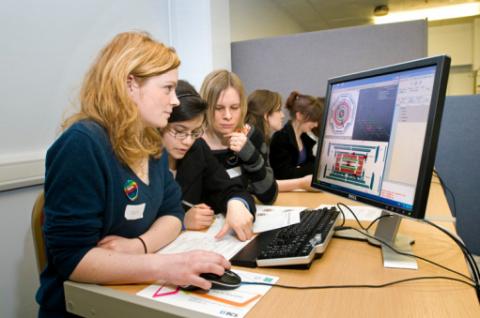
This Friday March 18, nearly 40 Lower Mainland high school students will role-play as physicists for an entire day using real data from the world’s largest subatomic physics experiment. They will be searching for exotic particles last seen naturally microseconds after the big bang.
During the event, the Particle Physics Masterclass, students use real data from the Large Hadron Collider (LHC) at the European Organization for Nuclear Research (CERN) in Geneva, Switzerland. Like a real physics experiment, it is a global event and students will be working with the “colleagues” around the planet during the day.
Students will discuss their results through videoconference with other Masterclass students from China, Japan, and the United States under the watchful eye of their teachers and local research scientists, Throughout the month, over 8,000 students from 23 countries have been invited to 130 institutions worldwide to participate in the Masterclass.
The Particle Physics Masterclass began in Europe in 2005, and emulates the form of art masterclasses where students work on a technique under the guidance of a professional. In this case students will learn the art of data analysis guided by professional research scientists and tutored by local high school teachers. It has spread to incorporate students and institutes from around the world taking part in various regional Masterclasses throughout March.
This year is the first time for Canadian students to participating in the Particle Physics Masterclass. It is a full day event taking place at SFU led by Professor Dugan O’Neil and at UBC by Professor Colin Gay and assisted at SFU by Vancouver teacher Mike Hengeveld and Surrey teacher Susan Hunter-Jivung, and at UBC by Richmond teacher Philip Freeman and past-teacher and now UBC PhD candidate Patrick Bruskiewich.
Professor O’Neil explains, “The goal of this two-day event is to provide the students with a reasonable understanding of what particle physicists do everyday and how particle physicists gather the results by leading the students to act in a way that particle physicists would act.” O’Neil also hopes that the students leave the event with an appreciation of how the work is done and the excitement and enthusiasm of particle physics.
The students will be led though an intensive full-day of lectures, peer and teacher instruction, scientist mentoring, lunching with scientists, and analyzing real data from the ATLAS experiment at the LHC. The highlight comes at the end of the day, when an analysis review videoconference is scheduled with other Masterclass students in the USA, Japan, and China. Closely emulating analysis videoconferences the research scientists attend regularly, the Masterclass videoconference has proven to be a big hit with students over the years.
TRIUMF Outreach Coordinator Dr. Marcello M. Pavan is very pleased that the Particle Physics Masterclass has finally taken root in Canada. “Now that ATLAS is taking real data, it seems the time was right for the Masterclass to come together here. We see this year’s event as the ‘first annual’ class, as well as a pilot for possible inter-Canadian Masterclasses with other universities across the country. “ Dr. Pavan is grateful to the SFU, UBC, and TRIUMF scientists who are giving freely of their time to inspire the students, and for the high school teachers for their time and patience assisting the scientists.
The event is sponsored by TRIUMF, Simon Fraser University (SFU), and the University of British Columbia (UBC), and organized in North America by the Fermi National Laboratory (FermiLab) in the USA.
-- Story by Angus Ng, TRIUMF Outreach student
